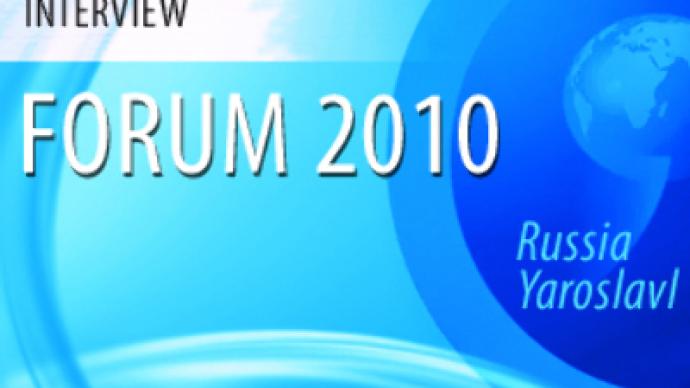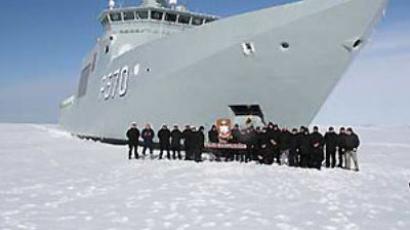"The US must allow the same level of sovereignty for others as for itself"

In this exclusive interview to RT Politics the well-known Russian economist Mikhail Delyagin points out that many suggestions advocated by American experts are actually a repetition of what the Soviet Union used to have.
On September 9 Yaroslavl is hosting an international forum that will be attended by analysts and researchers representing some 30 countries. Russian experts are expected to make some sensational suggestions, e.g., improving relations with the US and Europe, joining NATO, creating special conditions for businesses and offering benefits to foreign specialists who come to work in Russia.RT: Many liberals in Russia say we need closer ties with the US. Do you think it is possible to discuss various issues with the United States and yet remain an independent state?Mikhail Delyagin: The Soviet Union discussed manyMikhail Delyagin- Doctor of Economics- Member of the Russian Academy of Natural Sciences- Director of the Moscow-based Globalization Institute- Served as economic advisor to all Russian cabinets in 1990-2003issues with the United States and yet was not influenced by America. The key is not to follow somebody else’s viewpoint blindly and to insist that there should be the same rules for everyone. To this day, many Americans like to think that all nations should gradually lose their sovereignty – all except the United States. The rules of discussion are simple: the US must allow the same level of sovereignty for others as for itself. Otherwise, there is no point in such discussions.RT: What can secure such a balance of sovereignties for Russia?MD: Our Strategic Missile Forces and advanced research that can guarantee that we won’t fall too far behind in the next few decades. Also, we need elite that won’t be controlled by our strategic rivals, say, through their assets outside Russia, and we need an effective system of governance.RT: One notable report to be presented at the forum suggests that Russia should join NATO. Why?MD:I think that the authors of the report want to prove that they are real friends of America. It looks like a competition in loyalty which has gone far beyond the borders of common sense. I don’t think Russia can join NATO. If Russia joins it on the same terms as, say, Estonia, our armed forces will take orders from Brussels, officially. In reality, they will take orders from the US. Russia will have to participate in wars we don’t need, like the one in Afghanistan. The Russian defense industry will be shut down, because one of the main reasons behind NATO expansion is the interests of the military-industrial complex in leading NATO countries.RT: Russia is going to remind everybody once again about the need for a fairer world order. Do you think the world will get the message?MD:Not everyone in the world is ready to listen. But on the whole, it’s time to advance the idea of a fair world, because the idea of profit has become self-destructive. The idea of a fair world, or sustainable development, has good prospects. The Dialogue of Civilizations Forum is advancing it quite effectively, and the US is now paying more attention to it. The problem is that some of our bureaucrats and the experts that serve them deny the idea of a fair world: the bureaucrats by their actions and the experts by their comments. China and Iran are more successful in promoting this idea.What can guarantee Russia’s sovereignty- Strategic Missile Forces- Advanced research providing modern arms- Patriotic elite- Keeping money in Russian banksRT: Many experts at the forum describe modernization as if it were a gift of the West that will revolutionize the situation in Russia. Is that so?MD: The Soviet Union was the second or third in the world in terms of technological progress and the absolute leader in social modernization. Ever since its collapse, we have been living in the situation of catastrophe and regress, destroying everything positive that we used to have. At the moment, modernization is nothing more than just a political slogan.RT: Liberal experts reject the idea that the state can stimulate modernization. If the state can’t do it, who can?MD: Even in the countries where prisons are private, modernization is stimulated by the state. Common people cannot perform strategic planning. Common people cannot renounce consumerism for the sake of some vague prospects; you need a certain degree of violence for that even in a very democratic country.RT: Recently President Obama extended health insurance to 50 million poor Americans. His wealthy opponents were close to starting a revolution. How can we seriously discuss modernization when another wave of the crisis is coming?MD: Obama only made one step to what was a norm in the Soviet Union. It will be easier for us to take this step, because we used to have the same thing on a much bigger scale and with better quality. Before the financial crisis, Americans lived well and thought they didn’t need to pay for the poor. But the crisis made the threat of falling living standards more real to them. They used to regard social spending as feeding parasites but now they view it more as a way to help themselves.What effects will joining NATO have on Russia- The US gets control over the Russian Armed Forces- The Russian army gets involved in military operations that Russia is not interested in (e.g., the Afghan war)- The Russian defense industry shuts downRT: Modernization and innovation will be one of the main topics at the upcoming Yaroslavl forum. But how can we make our business people introduce innovations, if in this country – as well as in many others, all they are interested in is making money and taking it outside the country?MD: If you build an economy of thieves, you can’t make people introduce innovations. But if you build an economy of manufacturers, people will introduce them spontaneously. We see this in the United States, for example.RT: At the forum, American experts will suggest to the Russian president that he should create two new positions that would report directly to him: Chief Technology Officer and Chief Information Officer. Can you imagine foreign experts giving advice to the US president?MD: On minor issues, yes. On key issues, no. The US president clearly realizes that he serves the American people and nobody else. And he clearly realizes that America is a sovereign state. But the problem is not with American experts; the problem is with the Russian president’s advisors, who obviously hold a different view on this issue.What Russia does not want from the US- Advisors and political analysts advocating American values- NATO membership- Businessmen who want privileges to make money in RussiaRT: But don’t we have such positions in Russia already?MD: We have Rostekhnadzor [Federal Service for Environmental, Technological and Nuclear Oversight], which exercises technological oversight. As for the Chief Information Officer [or the Chief Designer of Information Systems, as the title was translated into Russian—Trans.], in Russia the title of chief designer usually implies that the person develops technologies that are totally new. We used to have chief designers for spaceships, submarines and so forth. Information systems are an already developed area. You don’t need a chief designer to borrow information technology from other countries – even if you improve it a little.RT: The president wants to take certain measures in order to protect venture businesses from prosecution if their projects fail. Does this mean that we want to attract losers to Russia?MD: Every time you fail, you learn something. In Russia, if a businessman fails, he may lose not only his property but even his freedom. That is unacceptable. There is no such thing in other countries.RT: In other words, we are inviting an even wilder and more lawless version of capitalism?MD:In the United States they make a clear distinction between a business that fails because of fraud and one that fails because of a mistake made in good faith. But not in Russia.RT: Will it do Russia good if we attract foreign business people by offering them privileges?MD:No, that would be colonialism.What can Russia suggest with respect to the new wave of the crisis- Restrict global monopolists. Set up an international anti-trust agency- Tough monitoring of risk capital movements on a global scale- Limit intellectual property rightsRT: Russia encourages the Russian specialists who moved to the US during brain drain to return. Why?MD:In Russia, people like to listen to political analysts who have embraced the ideology of our rivals. In my opinion, it’s wrong to help them return and even listen to what they say. Actually, they are our enemies. As for specialists in natural sciences and information technology, of course we need them. We just need to make sure that they are genuine researchers and that good conditions are provided for them.RT: Which of Russia’s suggestions could help the world deal with the next wave of the financial crisis? MD: First, introduce harsh restrictions on global monopolists. Create a global anti-trust agency. That’s because global monopolies often prevent countries from developing and acquiring modern technology. One big factor that triggered the global crisis was the poor situation with global monopolists. Second, we need tough monitoring of risk capital movement on a global scale. Introduce harsh restrictions at both national and global levels. We’re already moving slowly towards this. For example, today nobody fears or protests against the capital transfer tax. Of course, at this point it has not yet been made part of the global policy. And third, we need to do our best to stimulate technological progress, even at the cost of limiting intellectual property rights. Intellectual property has mutated into an instrument that global monopolists use to protect their interests. This has little or nothing to do with protecting the rights of authors and inventors.Nadezhda Kevorkova, RT














